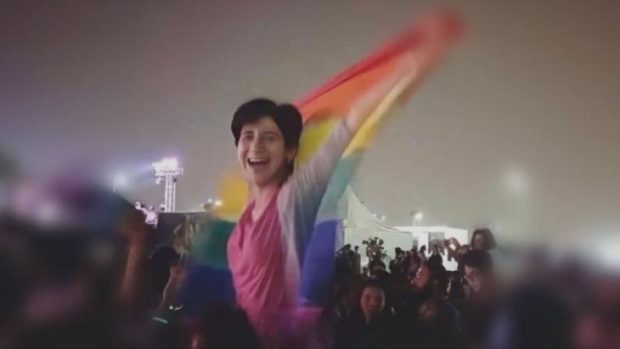There is something euphoric about the smile on Sarah Hegazi’s face in the photograph that changed her life.
She’s at an outdoor pop concert in Egypt, standing against a smoky grey sky, towers of floodlights in the background. Her arms are outstretched, holding a rainbow flag behind her shoulders like an exotic butterfly’s wings.
She is free and she is happy.
Afterwards, she was arrested for displaying that flag, a symbol of LGBT rights, before being tortured, imprisoned and finally exiled. It was a chain of events that ended this month in her suicide, aged 30. Her final note included a message for the world. “You have been greatly cruel at times, but I forgive.”
It is an extraordinarily potent concept forgiveness, one that forces its way tenaciously through the world’s darkness like a forget-me-not through the dank waters of a stagnant ditch. It has all kinds of philosophical and theological significances, and yet somehow, at the root, the complexity becomes a very simple thing that captures the best of being human. Reading Sarah’s words brought back a moment in my past when my understanding of forgiveness deepened in a heartbeat.
I used to find this incident difficult to recount because it was painful. But it had a redemptive quality that I came to recognise, one that both humbled me in my stupidity, but also uplifted me with the depth of its possibilities. I had gone to interview Julie, a woman who lost her daughter in the 7/7 London bombings. She was a minister who had been questioned endlessly about her vocation since her daughter’s death. She was, after all, a Christian. Did she forgive the bombers?
The question seemed almost a subtle trick. If she didn’t forgive, she was a bad minister. If she did, she was a bad mother. Julie had written a poignant, emotionally sophisticated book about her experiences. We sat in her kitchen discussing the fact that she intended resigning her ministry, and the concept of forgiveness. Some things were appropriate to forgive instantly, she said. The kind of thing a bunch of flowers or a box of chocolates would rectify. Other things weren’t.
When the interview was over, the tape switched off, we sat chatting quietly about books and writing and family. Did I have children? I did. What were they like? I have no idea why I said what I did next. It was not a phrase I would use normally so perhaps there was something that, because of our conversation, had subconsciously lodged the idea of ‘bomb’ in my head. My son was very laid back, I laughed. Horizontal, in fact. Needed a bomb under him sometimes to move him…
When the word landed in the stillness, something exploded inside me. What had I said? Had she noticed? It was just an expression – perhaps she hadn’t. Should I mention it? Not mention it? Julie did not flicker. Our conversation continued but I didn’t hear a word, answering on autopilot until I could bear it no longer. “I am so sorry for what I said,” I told her. It didn’t matter, she said. It did matter. It was stupid… a careless, throwaway phrase. “Well,” she said quietly, looking at me very directly, “I forgive you.”
It was so dignified. But more than that, it instantly highlighted everything she had said about the appropriacy of forgiveness. I hadn’t meant to hurt her and therefore she forgave. Her daughter’s death? That was a different thing. Perhaps in time…
Every so often, that conversation, talking in the kitchen as the afternoon light faded, comes back to me. It did when I read Sarah Hegazi’s final words. Sarah was a lesbian, an LGBT activist, who was tortured because of who she was. A month after she was forced to leave Egypt for Canada, her mother died of cancer. She was devastated. Home, she said, was not defined by boundaries and borders. It was defined by those you loved. There was nobody she loved in Canada. It therefore wasn’t home.
That photograph with the flag… it wasn’t political, she insisted. It wasn’t courageous. It was just joyous. She felt a happiness in the expression of who she was.
Clearly, that happiness later disappeared. One of her friends says that since she died, 90% of the comments on social media about her have been “vile” – but even 10% support is progress in Egypt.
People have replied to a post saying “May God have mercy on her” with the toxic retort that she was “not worthy of God’s mercy”.
In the film “Philomena”, which is about Catholic nuns who deliberately prevented a woman being reunited with her adopted son before he died, the title character says she forgives their calculated malice. The journalist helping her is outraged. He sees the insistence on forgiveness as an abusive control – as, indeed, in Philomena’s case it is. Forgive me my deliberate harm – or you are unworthy.
But before forgiveness, there has to be repentance. Sarah Hegazi had nothing to be sorry for. Her critics did. Interesting, then, which way round the forgiveness flowed.











